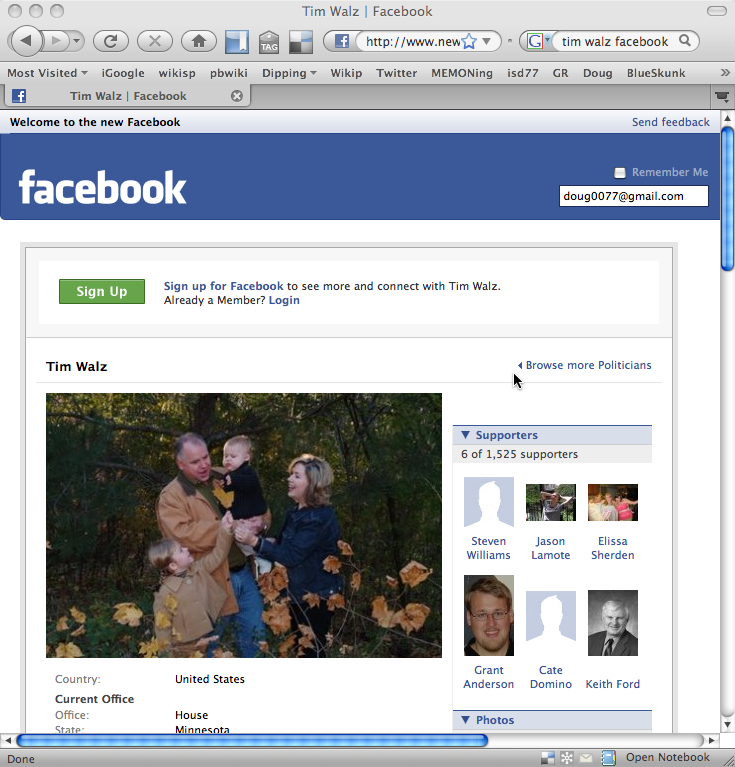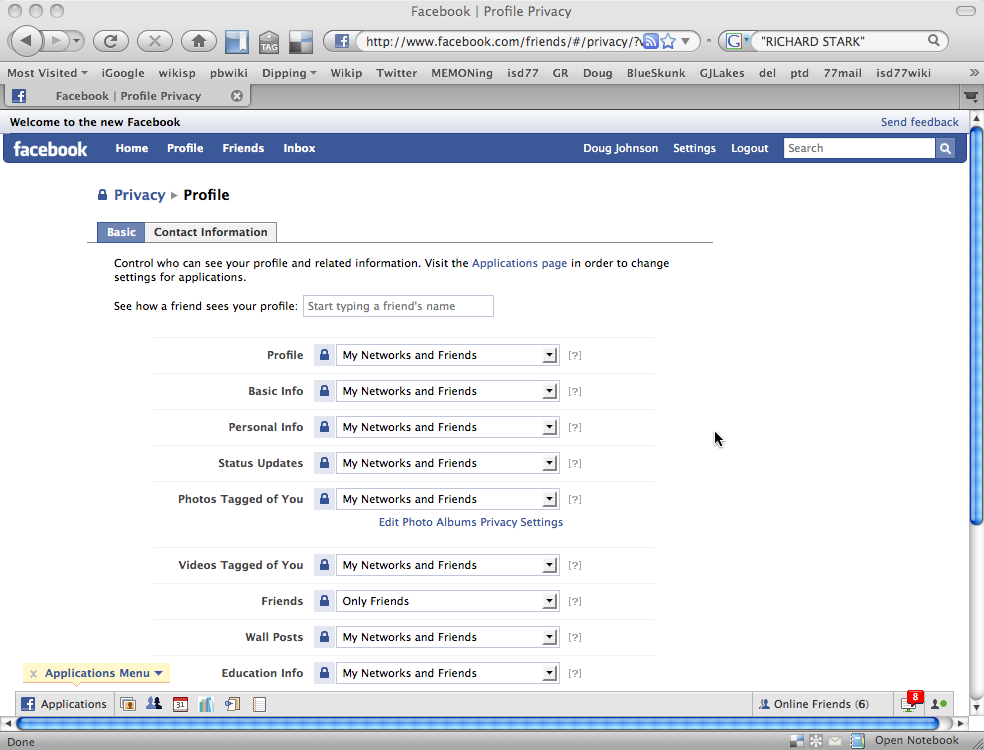Facebook - an educational resource?
 Monday, October 6, 2008 at 09:14PM
Monday, October 6, 2008 at 09:14PM
"Everyone charged with a criminal offence shall be presumed innocent until proved guilty according to law". Convention for the Protection of Human Rights and Fundamental Freedoms of the Council of Europe
Every website shall remain unblocked until proven to be "harmful to minors."
The Blue Skunk
I'm going to visit with our elementary principals' group in a couple weeks. I've (ominously) been asked to discuss Facebook with them. One never knows the genesis of such a request, but it may center around why our district doesn't block such sites.
Or maybe it is purely academic curiosity. I hope so, but I think I will be prepared just in case.
I don't much care one way or the other if kids have access to Facebook itself at school. I am a very occasional and reluctant user of the service. I just don't get the appeal. (Although now that I am up to 60 friends, I may consider running for public office.) Its value on the surface seems recreational in nature and it's probably a nuisance trying to keep kids from using it.
But I do care that we give all Internet resources due process, just as we would give due process to any library or text book before before removing it from our schools.
For educators who don't use Facebook, it needs to placed in some kind of context beyond the scare stories on Dateline. Here are some things I think my principals ought to know about these kinds of social networking sites:
1. How and why people use sites like Facebook. I think I will show the short Common Craft video Social Networking in Plain English and share the Educause two-page document 7 Things You Should Know About Facebook II.
2. That there may be Informational value to having access to Facebook, and that really, we should be blocking based on content, not format. Along with both Obama and McCain, one of our favorite sons, a first year US Representative, uses Facebook to connect with his constituents:

Shouldn't students have access to this information?
3. Facebook is but a single manifestation of social networking, a means of communication and recreation that today's children are growing up with. Club Penguin and Webkinz are popular social networking sites for the pre-school set. Facebook is replacing e-mail as a preferred method of communication. Even educational gaming is becoming more social, as evidenced by new and emerging products like vMathLive.
4. Schools DO need to teach safety and privacy with all social networking tools. If we don't, who will? Educators need to know that privacy levels can be set on most sites and children need to know how to do this as well.

5. Safety issues need to be put in perspective by sharing reputable information resources such as Predators & cyberbullies: Reality check by Larry Magid & Anne Collier at ConnectSafely.org. report:
"we do not have a single case related to MySpace where someone has been abducted." - social media researcher danah boyd
Recommend the books MySpace Unraveled and Cyber-Safe Kids, Cyber-Savvy Teens: Helping Young People Learn to USe the Internet Safely and Responsibily. Emphasize that "reputation destruction" and cyberbullying are more likely hazards than predation.
Show:
and
6. It's OK for individual buildings, libraries and classrooms to set their own rules on what is considered "productive" use of school time and technology. But a district-wide block needs to considered by a range of stakeholders after study, not as a knee-jerk response to any single request.
OK, readers. What would you do at a command performance of administrators asking for a discussion about Facebook? Help me out here...
I just remembered that I addressed this issue a couple years ago, See also Seven Things All Adults Should Know About MySpace at Education World. Duh.








Reader Comments (8)
Doug. We are very focused here on Inquiry Based Learning programs and one of the components, alternative products and audiences. I would like to suggest that your principals hear a bit about how Facebook might be (and has been) used as a student product. For example, in a group of students each one creates a facebook page for one of these folks: Abe Lincoln, Salmon Chase, Edward Bates, William Seward etc. Then they go in and create a Facebook Group. - explaining how these folks worked together. What were the controversies, decisions etc? Great way of demonstrating that they not only understand the history here but also the concept of leading and making decisions by listening to all sides and points of view...
Projects like this require lots of research, knowledge and understanding. Facebook is a great way to demonstrate learning in the area of biography, history etc.
One thought... Positive demonstration of kids using social networking for learning.
Can't see the videos in yourpost here at school--blocked by my school's filter. I have no answer for your question because if my admin asked for that kind of presentation, I'd be looking up your stuff first! This post did, however, lead to some thoughts on my own blog. I agree whole-heartedly with the "due process" idea. It's even weird to have to type that. Our district now blocks Wikipedia and I've heard of nearby districts that block all outside email. It's just getting nuts. I'll certainly be bringing it up in my Info. Tech class this week. Thanks!
While I agree with you in theory - I think you'll find that the truth is that most of us do not do this. Most of us are more along the lines of "Every website shall remain unblocked.... until our filtering product has decided to categorize it into one of our predetermined categories and it becomes blocked even though we have never seen or reviewed it at all". So, from a philosophical standpoint, I would like to think we could operate in the way you suggest, but I am speaking for my district in saying that we do not have the resources to determine locally by reviewing every website - we delegate that to our filtering company. We have every plan in place and procedure to reverse their judgment, but it is not the same thing as selection. "We" do not give internet resources due process - our filtering company does (and we only reverse it when there we believe an error in judgment has occurred). I am not saying this is right, but I am saying it is doable with the resources available, and I would think any district who filters probably does something similar by not reviewing every site before blocking but instead taking the company's word for it.
My contention is still that schools do not run into trouble on the philosophical stance (most people seem to be OK with the idea that visual pornography is blocked but not reviewed), but rather the extent to which it is applied (ie banning all blog sites in the name of some law - probably ought to ban word processors too). Most of the responses you will see here and on other blogs deal not with the philosophy of prior review but the extent to which people pick some very broad categories to block.
Can we teach the good/bad about a web site without actually going to it and looking? I believe we can, and so I believe there will always be some web sites that should be blocked.
I know from personal experience that students are spending a great deal of time with applications, web sites, and other technology without really knowing that technology. They use Facebook because its the thing to do, just like they used MySpace because it used to be the thing to do. Do we really need to teach them the correct or useful way to use social networking sites, or do we give them a better understanding of the positives and negatives of this type of service?
I think that the student will use these sites according to their friends input, but I believe we can help them understand the results and consequences...and since so many have and use social networking, we as educators need to be involved.
Thanks, Doug, very informative post. *runs to blog one of those connectsafely.org videos herself*
I don't think we can harp on this particular message enough. For my part, I've written a rant (okay, article) that will appear in Knowledge Quest a couple of issues from now. My other overarching concern (in addition to the universal obsession over social networking) is the prohibition in so many schools against use of the Internet for other than "educational" purposes. The student who comes to the library to check out books and magazines on crafts or cars or wrestling can't go to the Web for the same. To me, it's the elephant in the room that no one talks about. I'm not buying the "scarce computer resources" argument anymore.
@ Hi Linda,
Thanks so much for sharing this interesting use of sites like Facebook. I had heard of a similar project using MySpace to create sites for literary characters.
Can you provide any links to examples I might share?
Thanks again. Great idea!
Doug
@ Thanks, Jim. I really believe the LMS folks are going to need to lead the charge on this Intellectual Freedom issue. What did Jerry Garcia say about someone needing to do some and it's incredibility pathetic it has to be us?
Doug
@ Hi Joel,
We, of course, rely on our filtering company to detect pornographic sites. But we DO have the ability to only select the minimum number of categories that must be blocked by CIPA and use an override white list.
I continue to worry about the potential political and religious bias of filtering companies "selection" policies!
All the best and thanks for the reality check,
Doug
@ Hi Kenn,
You make some excellent points.
For the sake of argument, I would add that we could certainly teach kids how to drive without ever putting them behind the wheel. But I wouldn't ride with them!
All the best,
Doug
I know from personal experience that students are spending a great deal of time with applications, web sites, and other technology without really knowing that technology. They use Facebook because its the thing to do, just like they used MySpace because it used to be the thing to do. Do we really need to teach them the correct or useful way to use social networking sites, or do we give them a better understanding of the positives and negatives of this type of service?
Most of us are more along the lines of "Every website shall remain unblocked.... until our filtering product has decided to categorize it into one of our predetermined categories and it becomes blocked even though we have never seen or reviewed it at all".